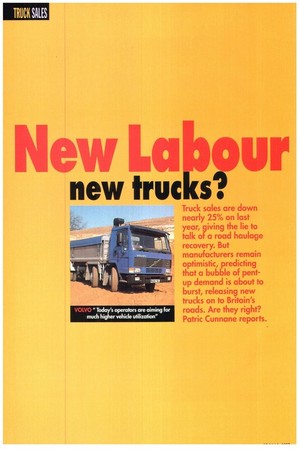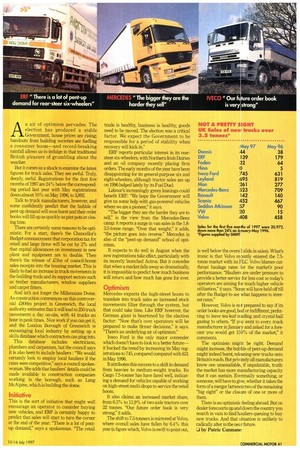New Labour
Page 42

Page 43

If you've noticed an error in this article please click here to report it so we can fix it.
new trucks?
An air of optimism pervades. The election has produced a stable Government; house prices are rising; handouts from building societies are fuelling a consumer boom—and record-breaking rainfall allows us to indulge in that traditional British pleasure of grumbling about the weather.
But it comes as a shock to examine the latest figures for truck sales. They are awful. Truly, deeply, awful. Registrations for the first five months of 1997 are 24% below the corresponding period last year with May registrations down almost 10% on May 1996, to 3,892.
Talk to truck manufacturers, however, and some confidently predict that the bubble of pent-up demand will soon burst and their order books will fill up as quickly as pint pots at closing time.
There are certainly some reasons to be optimistic. For a start, there's the Chancellor's Budget announcement that corporation tax for small and large firms will be cut by 2% and that capital allowances on investment in new plant and equipment are to double. Then there's the release of £5bn of council-house sales receipts into the housing market. This is likely to fuel an increase in truck movements in the building trade and its support sectors such as timber manufacturers, window suppliers and carpet fitters.
And let's not forget the Millennium Dome. As construction commences on this controversial f.,800m project in Greenwich, the local authority estimates that it will lead to 250 tuck movements a day on-site, with 44 trucks an hour in peak times. Nice work if you can get it, and the London Borough of Greenwich is encouraging local industry by setting up a skills database which contractors can plug into.
This database includes electricians, plumbers and carpenters, but the council says it is also keen to include hauliers : "We would certainly look to employ local hauliers if the rates were competitive," says a council spokeswoman. She adds that hauliers' details could be made available to construction companies working in the borough, such as Lang McAlpine, which is building the dome.
Initiative
This is the sort of initiative that might well encourage an operator to consider buying new vehicles, and ERF is certainly happy to predict that sales will start to turn the corner at the end of the year: "There is a lot of pentup demand," says a spokesman. "The retail
trade is healthy, business is healthy, goods need to be moved. The election was a critical factor. We expect the Government to be responsible for a period of stability when recovery will kick in."
ERF reports particular interest in its rearsteer six-wheelers, with Northern Irish Dairies and an oil company recently placing firm orders. The early months of the year have been disappointing for its general-purpose six and eight-wheelers, although tractor sales are up on 1996 helped lately by its Fuel Duel.
Labour's increasingly green leanings could benefit ERF: "We hope the Government will give us some help with gas-powered vehicles where we are a pioneer," it says.
"The bigger they are the harder they are to sell," is the view from the Mercedes-Benz camp: it reports a surge in van sales in the 1.83.5-tonne range. "Over that weight," it adds, "the picture goes into reverse." Mercedes is also of the "pent-up demand" school of optimism.
It expects to do well in August when the new registrations take effect, particularly with its recently launched Actros. But it concedes that when a market falls away so dramatically, it is impossible to predict how much business will return and how much has gone for ever.
Optimism
Mercedes expects the high-street boom to translate into truck sales as increased stock movements filter through the system, but that could take time. Like ERF however, the German giant is heartened by the election factor: "Now that's over operators will be prepared to make firmer decisions," it says. "There's an underlying air of optimism."
Iveco Ford is the only major contender which doesn't have to look to a better future— it bucked the trend by increasing its May registrations to 745, compared compared with 631 in May 1996.
It attributes this success to a shift in demand from heavies to medium-weight trucks. Its Cargo 7.5-tonner has have fared well, indicating a demand for vehicles capable of working on high-street multi-drops to service the retail boom.
It also claims an increased market share, from 6.3% to 11.9% of two-axle tractors over 32 tonnes. "Our future order book is very strong," it adds.
The shift to 7.5-tonners is mirrored at Volvo, where overall sales have fallen by 6.4% this year (a figure which, Volvo is swift to point out, is well below the overa: I slide in sales). What's ironic is that Volvo recently entered the 75tonne market with its PLC. Volvo blames cutthroat haulage rates for the market's poor performance. "Hauliers are under pressure to provide a better service for less cost so today's operators are aiming for much higher vehicle utilisation," it says. "Some will have held off till after the Budget to see what happens to interest rates."
However, Volvo is not prepared to say if its order books are good, bad or indifferent, preferring to leave tea-leaf reading and crystal-ball gazing to others. "If you went to every truck manufacturer in January and asked for a forecast you would get 150% of the market," it comments.
The optimists might be right Demand might increase, the bubble of pent-up demand might indeed burst, releasing new trucks onto Britain's roads. But privately all manufacturers know one unassailable, if unpalatable, truth: the market has more manufacturing capacity that it can sustain. Eventually something, or someone, will have to give, whether it takes the form of a merger between two of the remaining "big eight" or the closure of one or more of them.
There is an optimistic feeling abroad_ But on dealer forecourts up and down the country you search in vain to find hauliers queuing to buy new trucks. And that situation is unlikely to radically alter in the near future.
CI by Patric Clamant!








































































































